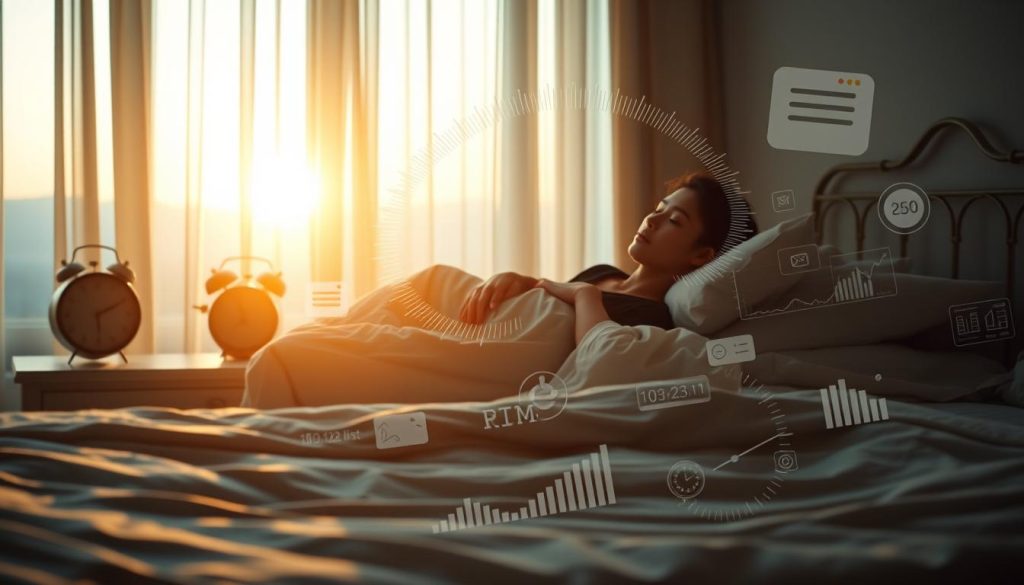Learning to improve productivity with circadian rhythm can boost our performance in work and life. By tapping into our natural cycles, we can do more and feel better. This article explores how circadian rhythms affect our daily activities and how to use them for better productivity enhancement.
Our bodies have a natural rhythm from waking up to bedtime. This rhythm controls our energy, alertness, and how well we work. Working with our body’s rhythm can help us stay at our best all day.
Understanding Circadian Rhythm
Our body has a natural clock called the circadian rhythm. It runs on a 24-hour cycle. This cycle controls when we sleep and wake up. It’s key for our overall health.
What is Circadian Rhythm?
The circadian rhythm is a 24-hour cycle in our brains. It switches between being awake and sleepy. Knowing about it helps us understand why we feel more awake at some times and sleepy at others.
Matching our sleep and wake times with our circadian rhythms is crucial. It greatly affects our health and how productive we are.
The Science Behind Circadian Rhythms
The suprachiasmatic nucleus (SCN) in our brain controls our circadian rhythms. Light affects the SCN, which then controls hormone release like melatonin for sleep. Other things like when we eat and exercise also influence these rhythms.
Biological Clock: How It Functions
Our biological clock manages many body functions. It controls hormone release, body temperature, and metabolism. It tries to keep our body in sync with the outside world for best performance.
The importance of the circadian rhythm can’t be stressed enough. It determines when we’re most alert and when we need to rest. This greatly impacts our sleep and wake cycles.
Importance of Circadian Rhythm in Daily Life
Knowing about your body’s internal clock can really boost your wellbeing. It controls many body processes, making sure they work well with your daily activities.
Influence on Physical Health
The benefits of your circadian rhythm are huge for your physical health. It helps your immune system fight off sickness better. It also makes digestion and nutrient absorption better, and lowers the risk of diseases like diabetes and heart problems.
Impact on Mental Well-being
A good circadian rhythm is key for your mental health. It helps control your mood, reducing anxiety and depression. It also improves memory, focus, and decision-making, making you mentally sharper.
Connection Between Circadian Rhythm and Productivity
Knowing how our circadian rhythm affects work can really boost our performance. By figuring out our internal clock, we can plan our work better. This way, we can be more efficient and sharp.

Optimal Work Timing
Everyone’s internal clock is different, affecting when they work best. Some people do their best in the morning, while others shine at night. Knowing when you’re most productive helps you schedule tasks that need focus and creativity.
This approach not only makes you more productive but also happier at work.
Enhancing Focus and Efficiency
Understanding our circadian rhythm helps us focus and work better. For example, tackle complex tasks when you’re most alert. Save simpler tasks for when you’re not as sharp.
Planning like this helps manage your work better and prevents burnout.
Strategies to Optimize Circadian Rhythm
Keeping your circadian rhythm in check is key for health, productivity, and happiness. By using the right strategies, you can make sure your body’s clock works well. Here are some ways to help you achieve this.
Creating a Consistent Sleep Schedule
One top strategy is to stick to a regular sleep schedule. Sleeping and waking up at the same time every day helps your body’s internal clock. This makes it easier to fall asleep and wake up naturally.
It’s also important to keep your sleep area clean and quiet. Make sure your room is dark, cool, and comfy. Try to avoid caffeine, big meals, and screens before bed.
Exposure to Natural Light
Getting outside in the morning is another great way to sync your circadian rhythm. Natural light tells your brain it’s time to wake up, making you feel more alert and happy. Spend at least 20-30 minutes outside in sunlight right after waking up.
If you can’t get outside, light therapy is a good alternative. A light therapy box can mimic natural light and help improve your circadian rhythm.
Here’s a table showing the benefits of regular sleep and morning light:
| Factors | Consistent Sleep Schedule | Morning Light Exposure |
|---|---|---|
| Benefits | Regulated internal clock, easier sleep | Enhanced mood, improved alertness |
| Methods | Fixed bedtimes and wake-up times | Natural sunlight or light therapy |
| Considerations | Avoid caffeine and electronics before bed | At least 20-30 minutes of light exposure |
Benefits of Synchronizing Work Tasks with Circadian Rhythm
Aligning work tasks with your natural energy cycles boosts productivity and work performance. Understanding your energy levels helps you plan your work for the best results. This way, you can do your best work when you’re most alert.
Increased Productivity
Working when you’re most energetic boosts your productivity. You can tackle tough tasks when you’re sharp and focused. This approach ensures your work is top-notch and done efficiently.
Research shows that people who work with their natural rhythms are more productive. They get more done without feeling drained.
Improved Work Performance
Matching your work schedule to your natural rhythm improves your performance. For instance, doing creative tasks when you’re most energetic leads to better ideas. It also reduces stress and burnout, making you happier and healthier at work.
By planning your tasks based on your energy levels, you can do better at work. This benefits you and your company, making it a win-win situation.
How Sleep Cycles Influence Productivity
It’s important to know how sleep cycles affect our work. Let’s explore the stages of sleep and how good sleep boosts our daily tasks.
Understanding Sleep Stages
Sleep is divided into stages, each with its own role in healing and learning. We have Non-REM and REM sleep.
- Non-REM Sleep: This includes light and deep sleep. Light sleep helps us fall asleep, while deep sleep heals and grows our bodies. It also strengthens our immune system.
- REM Sleep: This is when we dream and our brain is most active. It’s key for learning, remembering, and managing emotions. Good REM sleep improves creativity and problem-solving.

Balancing Sleep and Work Schedules
To work better, we need to match our work hours with our sleep patterns. Here are ways to do it:
- Maintain a Consistent Sleep Schedule: Having a set bedtime and wake-up time helps our body’s clock. This keeps our sleep and work consistent.
- Create a Restful Environment: A quiet, dark, and calm sleep area improves sleep quality. This leads to deeper and more restful sleep.
- Manage Light Exposure: Being in natural light during the day and avoiding screens before bed helps sleep. Natural light keeps our body’s clock stable, important for sleep and work.
- Implement Relaxation Techniques: Doing things like meditation or reading before bed gets our body ready for sleep. This improves sleep quality.
Using these tips helps keep sleep quality high, which boosts productivity. Understanding sleep cycles and productivity is key to a better life.
Practical Tips for Aligning Work with Your Circadian Rhythm
Aligning your work with your natural rhythm can make your days more productive and fun. Here are some tips to help you use your morning energy and beat the midday slump.
Morning Routines for Success
Begin your day with activities that boost your morning energy. This sets a good mood for the rest of the day. Here are some tips:
- Wake up at the same time every day to keep a routine.
- Do some light exercise like a short walk or yoga to wake up your body.
- Eat a balanced breakfast with protein and healthy fats to feed your brain.
- Do your toughest tasks in the morning when you have the most energy.
Midday Productivity Boosts
The midday slump can make it hard to stay productive. A few smart moves can help you stay sharp and focused:
- Take a short walk outside to get some sunlight and clear your mind.
- Eat a healthy lunch with complex carbs and lean proteins.
- Take short, five-minute breaks between tasks to keep your energy up.
- Use tools like the Pomodoro Technique to manage your time and take breaks.
By matching your work to your natural rhythm, you can make the most of your morning energy and avoid the midday slump. This leads to better productivity and overall health.
Case Studies on Circadian Rhythms and Workplace Efficiency
Workplace efficiency studies show how important circadian rhythms are for better work. Research shows that working when your body is most alert can really boost performance.
A study on a top tech company found a big win. By scheduling work for when employees were most awake, productivity jumped by 20%. This shows how circadian rhythm research can make work better.
In healthcare, studies also show great results. Nurses and doctors who work when they’re most alert are less tired. This leads to better care and happier workers. These examples show how using circadian rhythms can improve work places.
Let’s look at some numbers to see the difference:
| Sector | Change Implemented | Productivity Improvement |
|---|---|---|
| Tech Industry | Work schedule alignment with circadian peaks | +20% |
| Healthcare | Shift scheduling based on circadian rhythms | Increased patient care quality |
These studies prove that knowing and using circadian rhythm research is key. It can make work places better and more balanced in many fields.
The Role of Energy Levels in Daily Productivity
Understanding how energy levels and productivity work together is key. By matching your activities with your natural energy peaks, you can boost your day. This way, you make the most of your body’s natural rhythm.
Managing Energy Peaks and Troughs
Knowing when you’re most alert is important. Most people are at their best in the morning and late afternoon. Do your hardest tasks then to use your energy wisely.
On the other hand, save easy tasks for when you’re not as sharp. This could be in the early afternoon. It helps you stay focused and avoid burnout.

Nutritional Considerations
Your diet affects your energy. Eating balanced meals with proteins, fats, and carbs keeps your energy steady. Eating smaller meals often helps avoid energy crashes.
Also, eating when your body naturally wants to can improve your energy and productivity. This aligns with your body’s natural rhythm.
Utilizing Technology to Monitor and Enhance Circadian Rhythm
In today’s world, using circadian technology can really help us improve our sleep and daily routines. We can use wearable devices and apps for sleep tracking and activity monitoring. These tools give us important data to match our routines with our natural body clocks.
Wearable Devices
Wearables like Fitbit, Apple Watch, and Oura Ring lead in circadian tech. They track your sleep stages, how long you sleep, and how well you sleep. They also watch your heart rate, body temperature, and movement to show your sleep patterns.
By looking at this data, you can make changes to sleep better and feel better overall.
Apps for Tracking Sleep and Activity
Apps like Sleep Cycle, Rise, and Garmin Connect are also key in activity monitoring and improving our circadian rhythms. They give us insights into our daily activities and how they affect our sleep. They suggest ways to keep routines consistent, boost energy, and be more productive during the day.
For example, Sleep Cycle tracks your sleep patterns and wakes you up at the best time in your sleep cycle. Using these circadian technology tools every day can make our days more balanced and productive.
The Psychological Impact of Circadian Rhythms
Our mental state and emotional wellbeing are deeply connected to our circadian rhythm. People with regular sleep patterns tend to feel better, think clearer, and handle emotions better. But, when our sleep rhythm gets out of sync, it can lead to serious mental health issues. This shows how crucial it is to grasp the psychology of sleep.
Studies reveal that the circadian rhythm mental effects are significant. Irregular sleep or too much artificial light can cause anxiety and depression. This highlights the need for a consistent sleep-wake cycle for our emotional health.
By understanding the psychology of sleep, we can improve our mental health. Good sleep habits help prevent long-term mental problems. It’s key for managing stress, emotions, and staying mentally sharp.
Strategies like a regular sleep schedule, less screen time at night, and more daylight can help our body clock. By living in sync with our circadian rhythm, we boost both physical and mental health.
| Aspect | Aligned Circadian Rhythm | Misaligned Circadian Rhythm |
|---|---|---|
| Mental State | Stable and clear | Anxiety, mood swings |
| Emotional Wellbeing | Enhanced | Reduced, prone to depression |
| Cognitive Function | Increased focus and memory | Decreased attention and recall |
Long-term Benefits of Circadian Synchronization
Keeping a well-synced circadian rhythm brings many long-term benefits. It greatly improves our health over time. People who match their daily routines with their natural body clock have a lower risk of chronic diseases like heart disease and diabetes.
By following a routine that fits our body’s internal clock, we boost our immune system. This makes us less likely to get sick. It’s a simple way to stay healthy.
Another big plus is living longer. Studies show that those who stick to a regular sleep schedule sleep better and live longer. A consistent circadian rhythm helps avoid sleep disorders and keeps our minds sharp as we age.
So, focusing on a well-synced circadian rhythm is key. It helps us stay productive and efficient for longer. This approach boosts our work performance and job satisfaction. It leads to a balanced life where we perform at our best and enjoy lasting benefits.

